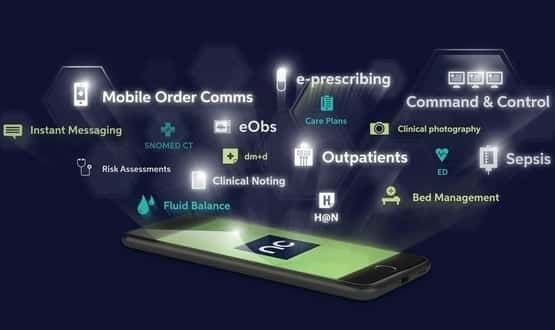Order Comms go-live at Leicester bolsters progressive EPR roll-out
- 6 April 2023

University Hospitals of Leicester NHS Trust (UHL) have successfully deployed Nervecentre Order Comms across their three large hospitals, one of the final focus areas of the trust’s progressive EPR programme roll-out with Nervecentre.
The Order Comms roll-out was deployed across all three hospital sites over a short-time period and only needed minimal staff training to safely use the new module instantly.
Across the trust, staff are already familiar with the Nervecentre interface, and the new module runs on the same Nervecentre easy-to-use principles.
An extensive range of Nervecentre software from patient safety modules such as ED, ePMA and Infection Control through to patient flow modules including live flow, are among a long list that has already been successfully integrated at UHL – all to achieve a seamless EPR digital solution for all staff at the trust.
Order Comms supports clinical workflow and processes and is a fully integrated part of the Nervecentre EPR. The patient safety advantages of Order Comms include summary dashboards showing easy-to-view visibility of tests that are outstanding or require review.
The search functionality is improved and more intuitive; at the same time reductions in errors -through the ability to positively identify patients and print pathology labels at the bedside – removes the need for hand-written patient details.
Andy Carruthers, chief information officer at UHL, said in a statement: “The addition of diagnostic requesting and results as part of our EPR partnership with Nervecentre is another leap forward in our digital maturity.
“Our teams have enthusiastically adopted the new capabilities with very few issues which is testament to the usability of the system and the hard work of our collaborative development and implementation teams.”
The benefits of gradual roll-out
Previously, UHL have been using ICE, solely accessed via desktops/laptops. By enabling clinicians to request tests on their mobile devices and to triangulate results, medicines, allergies and other information in one place Order Comms is already delivering significant benefits in terms of time, efficiency and patient safety.
“Most [EPRs] roll out with a big bang, and that comes with somewhere between a year and 18 months of pain, requiring users to get learning in a short period of time.
“We are trying to prove that if you do it in stages it is smoother, and less of a negative effect on staff and patients,” Nervecentre CEO Paul Volkaerts told Digital Health News.
Progressive roll-out, he observed, means that users can rely on peer networks as they gain familiarity with the system. The fact that Leicester was willing to roll out Order Comms the week before junior doctors are scheduled to strike shows the trust’s level of confidence, he said.
He added: “No one is using the system for the first time without someone standing by who has used it.”
Because all parts of the Nervecentre system use the same workflow, the training needed to use individual modules is low compared with other systems, the company’s CNIO Vicki Kaluza told Digital Health News.
“We let people train on the wards, so they don’t need to leave the wards for the classroom,” she added.
Leicester is Nervecentre’s main development partner and is helping the company to develop the functionality of the system.
The ePMA provider is also progressively rolling out its system elsewhere in the East Midlands, including at Nottingham University Hospital Trust, where ePMA and Order Comms are due to fully launch in the next few months, as well as at Sherwood Hospitals.
Imminent next steps in completing the EPR project at UHL will include the deployment of the Nervecentre PAS later this year.




